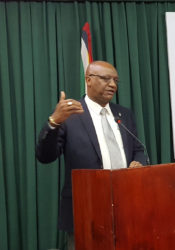Several private schools have written to government over the recently implemented 14% VAT on private education, according to Minister of State Joseph Harmon, who said yesterday that the issue is now engaging the attention of Cabinet.
The new tax has caused quite a stir since it took effect on February 1st, 2017 and Minister of Finance Winston Jordan has already publicly said that parents have the choice of sending their children to public schools.

Harmon responded in the affirmative when asked if government was reviewing the 14% VAT on private education.
He said that he was unsure about reports of drop outs, particularly from private tertiary institutions but noted that the Minister of Finance had previously said that many of these private schools were private charter schools and therefore were not paying taxes.
He said the minister and his ministry will soon make information public to “lay the case on the table”. He did not say when this information will be released.
“What I can say is that it did attract the attention of Cabinet and Minister Jordan is examining it and is going to come out with a very clear statement on the matter,” he said.
He stressed that he has seen some letters by some private schools which are now being addressed by government. He said that he has already acknowledged receipt of those letters and has informed the writers that government is addressing the matter.
While speaking to Stabroek News on the corridors of the Public Buildings, Jordan had said, “While the earnings from VAT can be used to address social ills; it is a fiscal tool.
Our Education Act says that we want to make sure people are not denied education and educational opportunities in Guyana. There is a wide range of education opportunities provided at both the state level and at the private level, the choice is always at the user to determine whether to use public or private.”
He reiterated, “VAT is not a cure for social ills; it is first and foremost a fiscal tool. I said we are aiming to reduce VAT but in doing so we will seek to broaden the base as wide as possible. There is no VAT on public education, it remains a choice of the parent. Government is not making that choice for them.”
Private education became subject to VAT on February 1, following the removal of zero-rated items, a measure of the 2017 Budget.
An online petition titled “Education is a Necessity, Let it be VAT free” has been started by students at the Nation’s Sixth Form College and aims to garner 20,000 signatures. It states in its explanatory note that it is “addressed to the politicians, economists, and strategists who made the decision to impose this levy and to simply ask them to seek some other means to raise revenue.”
It argues that this new measure will not only affect students of private institutions but is an issue “which affects us all in Guyana.”
The petition followed a letter to the editor written by Dr Brian O’Toole, Director of the School of Nations, in which he argued that making private education subject to VAT would disenfranchise several disadvantaged persons who utilize the service.
He noted that one of the most popular programmes offered at his school is a series of courses from the Association of Business Executives (ABE) from the UK which is being accessed by several school leavers. He said that some of his students may be forced to withdraw from the programme.




